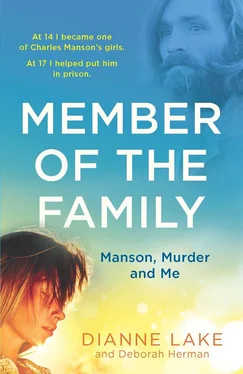“If you don’t tell her, I will,” Emily’s mother insisted. I knew that she would too, because she and my mother were friends who often went to each other’s houses for coffee.
“Okay, I will tell her,” I promised.
When I got home my mother was in the kitchen by herself. She was making soup and asked me if I would like to stir the pot.
“Can I talk to you, Mom,” I said softly. She turned off the stove and we went into the dining room.
“If it is about your hair, I already told Grandma she should not have permed it without asking me first.” She reached for my hair. I started to cry. “It will grow back soon enough,” she reassured me. This only made me sob more.
I told her about Grandpa and the bath and watched her expression change. Tears streamed down her cheeks and she held me close. We both cried.
“That wasn’t your fault,” she reassured me. I didn’t understand what she meant. But I knew by her reaction that something bad had happened, something that could never be taken back.
Later that night I overheard my parents arguing. I knew it had to do with my grandpa telling me about where babies come from. I was very confused. Why was it wrong for my grandpa to tell me the truth? He didn’t make it sound like it was wrong. Maybe I did something wrong to make everyone so upset. I wished I had never said anything to Emily.
The next day I overheard my father calling my grandpa on the phone. I wasn’t even trying to listen, but he was yelling for most of the call. I could hear only his side of the conversation, but he seemed very angry. “It’s me. You know why I am calling. You expect me to believe you over my own child? I know what a sick old bastard you are!”
I wasn’t used to hearing my father curse since the car broke down, and especially not at Grandpa. But I knew my father meant what he said. I felt awful about Grandpa and somehow felt sad for Grandma. If I hadn’t gone to see them, no one would have been upset. I ran into my room before my dad could see that I had been eavesdropping on his phone call.
Like most kids who have been sexually abused, I didn’t understand at the time what was going on or how I’d just been violated. Still something felt off, and I felt different—about my grandpa, about myself. Something had changed, I knew that much, even if I didn’t fully understand what it was. Thankfully, unlike what happens in many situations of sexual abuse, they didn’t blame me, but they didn’t know how to talk to me about the abuse either, so they avoided it. And without more reassurance from them, I fully blamed myself and dealt with the consequences of that guilt for years.
But guilt was just one piece of my emotional chaos. Though I wouldn’t understand it fully until much later, this upsetting and disturbing encounter enabled years of sexual confusion to come, as a part of me would spend the rest of my youth seeking a level of safety in the wrong people and for the wrong reasons. Sexual abuse creates an emptiness in the darkest places within. From now on, things would never be the same for me.
As fall of 1962 rolled around, my parents and I were glad to put the events of the summer behind us, and with the new school year under way, by all appearances things had returned to normal or whatever our version of that was. Beneath the surface, though, all was not well with us. My father was becoming restless once more. He wasn’t speaking about California or philosophy or change, but that didn’t stop fate, or something like it, from intervening.
One night before leaving his studio my father must have put out a cigarette in a trash can. The next day we went to his now-charred sanctuary to dig through the rubble and ashes to salvage anything of his work. We found scraps of his illustrations and charred canvases. I found the portrait of me that used to hang in our big beautiful home completely ruined and burned. The only thing I recognized was some of my hair and the wicker chair I had been sitting on when I posed for him.
Only in retrospect did I question whether he might have thrown the cigarette in the can on purpose. He’d been sullen ever since the confrontation with Grandpa, and while he’d continued to paint, he’d been melancholy and lacking in purpose, at least in part because he had been forced to accept that his own father was a miscreant. As I would learn years later, there had been other suspicions about his father’s behavior, but people either didn’t believe it or looked the other way. It wasn’t until years after Grandpa’s death that other people spoke up about how he’d isolated Grandma from her own relatives, verbally abused her, and had been caught molesting the daughter of his own brother.
My father may have been angry at his father, but he also never seemed to like it when things were going too well. He was a five-pack-a-day chain-smoker, so he should have known better than to put his cigarette out where it could set things ablaze—unless of course that was what he wanted to do. I’ve long wondered if my father, the man who traded our house for a trailer, was looking for another way out of a normal family life when he left his studio that night.
Whether the fire was an accident or not, the blaze accentuated how my father was outgrowing his surroundings. Around the same time, he started receiving some backlash for his artwork, which had begun to border on the controversial. We belonged to a Lutheran church that had always welcomed his contributions, at least until he painted a dark-skinned Jesus. This caused a scandal among the staid Christian community who couldn’t imagine such a heretical statement. Then they came to our house to try to force a greater tithe, which only upset my father more.
After the fire and the rejection from the church, my father fell into a deep depression. I would overhear the grumblings after my parents thought we were all asleep. He made it clear the drive and desire to go to California had never disappeared. He implied that it was our fault that he had been forced to settle in Minneapolis again after his first try for freedom. His unhappiness was visible on his face and in his body, the tension trapped in his muscles. At first his books and music had fanned the flames of his wanderlust. When they could no longer distract him, he focused on blaming the people of Minnesota for being too small-minded to “get it” or to “get him.” My mother, in her reverence for my father and his genius, would agree with him, while encouraging him not to make any more waves.
My father had a complex relationship with the church. A seeker by nature, he was inspired by the teachings of Christ. At one point he had even tried studying for the ministry but had felt stifled by the dogma of Christianity. The people of our church made sure there was no home for him there. My mother had been brought up in a Norwegian family with a conspicuous lack of outward affection. She had a strong faith in God but was looking for a way to define this that was inclusive and loving. She seemed torn between pleasing my father by being avant-garde and fitting in with the church crowd. She liked the artists in our home but also enjoyed the community the church had afforded her.
But my father’s depression this time was not just petulance at things not going his way. He was drinking and staying out until all hours. My mother covered for him and told us that he was just working through the loss of his studio and we had to give him time. Then I would hear her cry at night while I listened to the clock ticking the seconds until dawn. I didn’t know how to comfort her, so I would bury myself in cleaning and vacuuming the house. We didn’t have any relatives to visit, and our eclectic mix of creatives must have sensed the tension—they no longer came around.
Читать дальше












